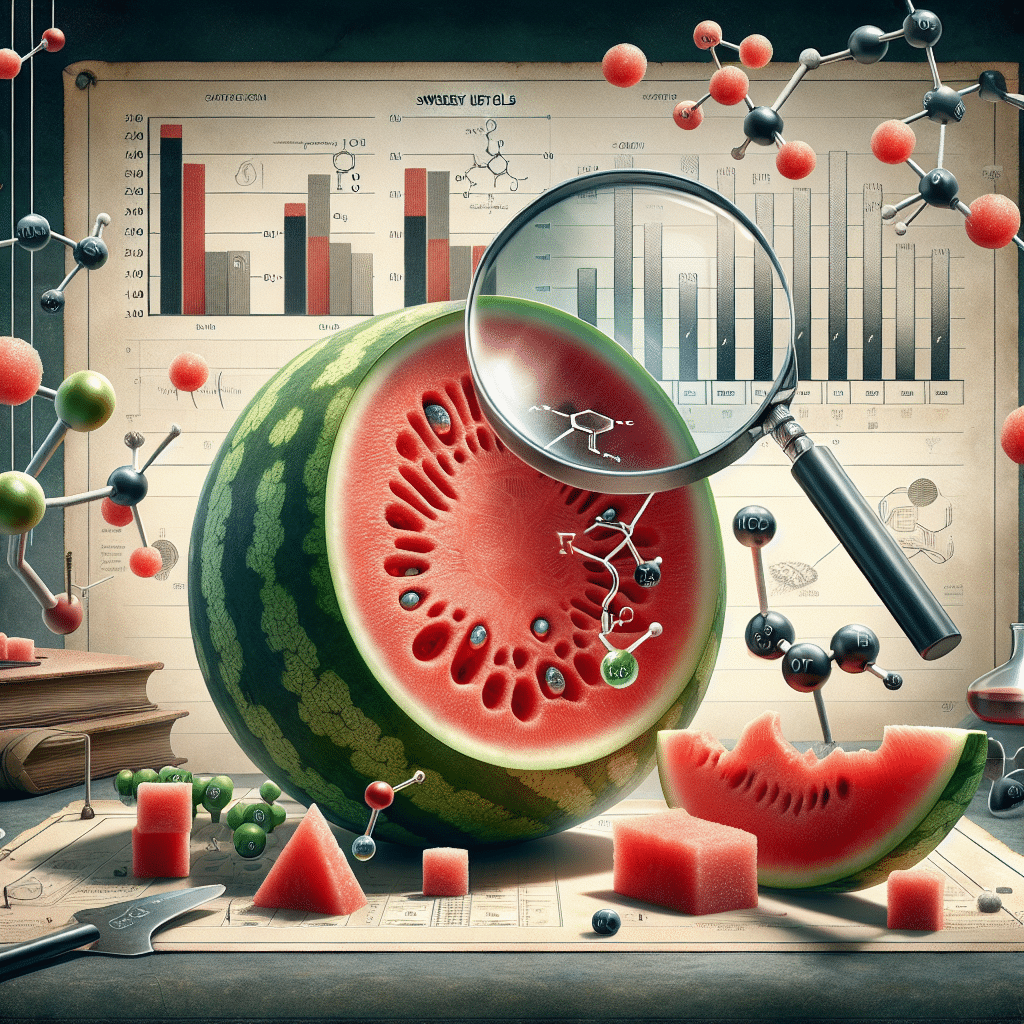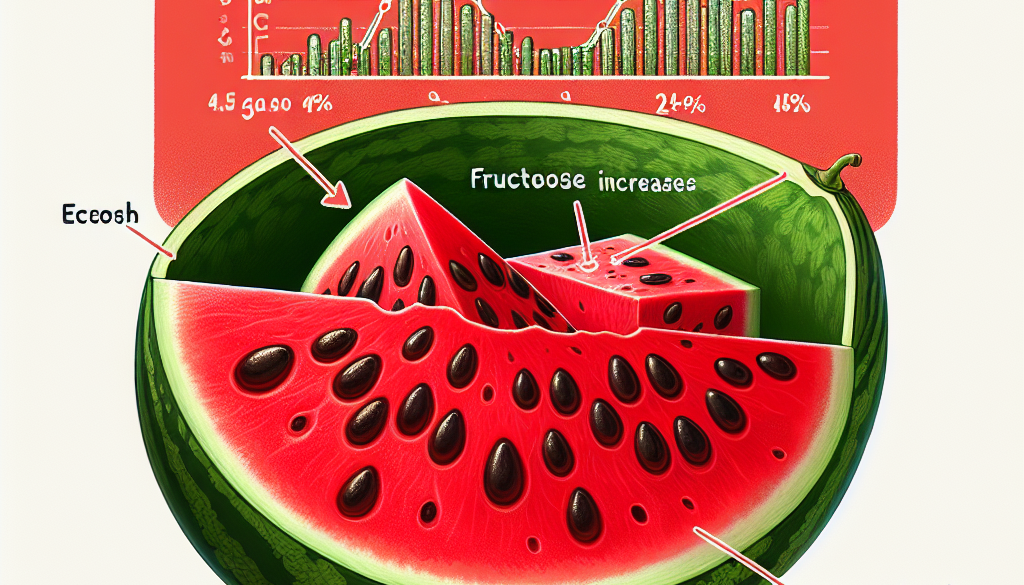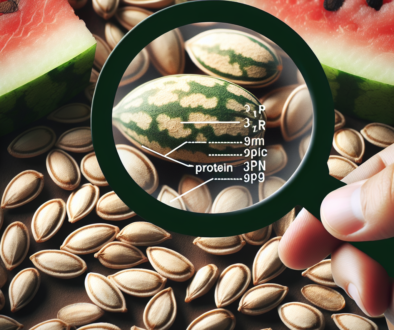Watermelon Fructose Levels: Sweetness Unveiled
-
Table of Contents
- Watermelon Fructose Levels: Unveiling the Sweetness Factor
- Understanding Fructose in Fruits
- The Sweetness of Watermelon
- Fructose Levels in Watermelon: A Nutritional Perspective
- Health Implications of Fructose Consumption
- Case Studies and Statistics on Fructose Intake
- Choosing and Storing Watermelons for Optimal Sweetness
- Conclusion: Balancing Sweetness and Health
- Discover ETprotein’s Watermelon Seed Protein Products
Watermelon Fructose Levels: Unveiling the Sweetness Factor

Watermelon is a quintessential summer fruit, known for its refreshing taste and hydrating properties. But beyond its thirst-quenching abilities, watermelon is also recognized for its natural sweetness. This sweetness is largely attributed to the presence of fructose, a type of sugar found in many fruits. In this article, we will delve into the fructose levels in watermelon, exploring how they contribute to the fruit’s sweetness and what implications they may have for health and nutrition.
Understanding Fructose in Fruits
Fructose is a monosaccharide, which is the simplest form of sugar. It is naturally occurring in fruits, honey, and root vegetables. In fruits, fructose is responsible for the sweet taste that we enjoy. However, the fructose content can vary widely among different types of fruits and even within the same type of fruit, depending on factors such as ripeness and growing conditions.
The Sweetness of Watermelon
Watermelon is particularly high in fructose compared to some other fruits. This high fructose content is what gives watermelon its signature sweetness. The level of fructose in watermelon can be influenced by several factors:
- Variety: There are many varieties of watermelon, each with a different sugar composition.
- Ripeness: As watermelons ripen, their fructose content increases.
- Cultivation practices: The soil, climate, and farming techniques can all affect the sweetness of the fruit.
Fructose Levels in Watermelon: A Nutritional Perspective
When considering the nutritional value of watermelon, it’s important to look at its fructose content in the context of the fruit’s overall composition. Watermelon is made up of about 92% water, which makes it an excellent choice for hydration. It is also a good source of vitamins, particularly vitamin C and vitamin A, as well as antioxidants like lycopene.
Despite its sugar content, watermelon has a relatively low calorie count due to its high water content. The fructose in watermelon is also accompanied by fiber, which can slow down the absorption of sugar and prevent spikes in blood glucose levels.
Health Implications of Fructose Consumption
While fructose in fruits is generally considered safe and healthy when consumed in moderation, excessive intake of fructose, particularly from added sugars and sweeteners, has been linked to health issues such as obesity, type 2 diabetes, and metabolic syndrome. However, the fructose in watermelon is part of a natural package that includes water, fiber, vitamins, and minerals, making it a healthier choice than fructose from processed foods and beverages.
Case Studies and Statistics on Fructose Intake
Several studies have examined the effects of fructose consumption on health. For instance, research has shown that consuming fructose in its natural state, as part of whole fruits, does not have the same negative effects as consuming fructose from added sugars. This is because the fiber in fruit helps to regulate the body’s use of the sugars.
Statistics from nutritional databases indicate that the average fructose content in watermelon is about 3.36 grams per 100 grams of fruit. This is higher than fruits like berries but lower than fruits like apples and pears.
Choosing and Storing Watermelons for Optimal Sweetness
To enjoy the best taste and sweetness from watermelon, it’s important to know how to select and store them properly:
- Selection: Look for a watermelon that is heavy for its size, indicating a high water content. A creamy yellow spot on the bottom suggests it has ripened in the sun.
- Storage: Keep watermelon at room temperature until cut. Once cut, store it in the refrigerator to maintain its sweetness and freshness.
Conclusion: Balancing Sweetness and Health
Watermelon’s fructose levels contribute to its delicious sweetness, making it a favorite summer treat. While fructose can be a concern when consumed in excess, particularly from processed foods, the natural fructose in watermelon is part of a healthy package that includes hydration and essential nutrients. By understanding the role of fructose in watermelon and its impact on health, consumers can enjoy this sweet fruit as part of a balanced diet.
Discover ETprotein’s Watermelon Seed Protein Products
If you’re looking for a nutritious way to incorporate the benefits of watermelon into your diet, consider ETprotein’s watermelon seed protein products. These high-quality protein supplements are derived from watermelon seeds, providing a plant-based protein source that’s both sustainable and allergen-free. Ideal for those following a vegan or vegetarian diet, ETprotein’s watermelon seed protein is a versatile ingredient that can be added to smoothies, baked goods, and more.
About ETprotein:
ETprotein, a reputable watermelon seed protein Chinese factory manufacturer and supplier, is renowned for producing, stocking, exporting, and delivering the highest quality organic bulk vegan protein and plant proteins. They include Organic rice protein, clear rice protein, pea protein, clear pea protein, watermelon seed protein, pumpkin seed protein, sunflower seed protein, mung bean protein, peanut protein etc. Their offerings, characterized by a neutral taste, non-GMO, allergen-free attributes, cater to a diverse range of industries. They serve nutraceutical, pharmaceutical, cosmeceutical, veterinary, as well as food and beverage finished product distributors, traders, and manufacturers across Europe, USA, Canada, Australia, Thailand, Japan, Korea, Brazil, and Chile, among others.
ETprotein specialization includes exporting and delivering tailor-made protein powder and finished nutritional supplements. Their extensive product range covers sectors like Food and Beverage, Sports Nutrition, Weight Management, Dietary Supplements, Health and Wellness Products, and Infant Formula, ensuring comprehensive solutions to meet all your protein needs.
As a trusted company by leading global food and beverage brands and Fortune 500 companies, ETprotein reinforces China’s reputation in the global arena. For more information or to sample their products, please contact them and email sales(at)ETprotein.com today.












